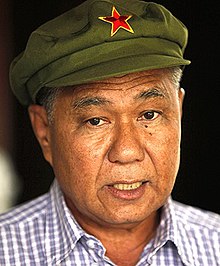Surachai Danwattananusorn (Thai: สุรชัย ด่านวัฒนานุสรณ์; born 24 December 1942, disappeared 10 December 2018) is a Thai political activist and former political prisoner. He was the last communist to be pardoned in Thailand, and after his release he entered mainstream politics, becoming a committee member of the Thai Rak Thai Party and founding the Red Siam political movement. Surachai is known for his anti-monarchist views, which have resulted in a past arrest under Thailand's lèse majesté laws.
Surachai Danwattananusorn | |
|---|---|
สุรชัย ด่านวัฒนานุสรณ์ | |
 Surachai Danwattananusorn in 2010 | |
| Born | 24 December 1942 Pak Phanang, Nakhon Si Thammarat, Thailand |
| Disappeared | 10 December 2018 (aged 75) Vientiane, Laos |
| Status | Missing for 6 years and 16 days |
| Alma mater | Sukhothai Thammathirat Open University (B.A.) |
| Political party | |
| Movement | Communist Party of Thailand |
Surachai has been in exile in neighbouring Laos since the Thai military coup of 2014.[1] He disappeared after the murder of two other anti-monarchist activists in December 2018.[2]
Political career
editSurachai became well known after the Thammasat University massacre, as he was a prominent member of the Communist Party of Thailand. He was sentenced to death for murder and his participation in a train robbery but received a royal pardon in 1988.[citation needed]
After his release, Surachai entered mainstream politics, first as a member of the New Aspiration Party under the leadership of Chavalit Yongchaiyudh, and later as a Thai Rak Thai Party candidate for the House of Representatives. He also ran for the senate seat of Nakhon Si Thammarat, but was never elected to any office.[citation needed]
In 2006, Surachai participated in protests to oust the Council for National Security junta. Afterwards, he established the Red Siam political movement with Jakrapob Penkair.[citation needed]
On 6 August 2007, while on stage at a United Front for Democracy Against Dictatorship rally, Surachai allegedly insulted then-Prime Minister Chuan Leekpai. He was found guilty by a criminal court and was fined 50,000 baht, but the fine was later reduced by half after Surachai confessed to the crime.[3]
Surachai was arrested again on 22 February 2011, this time according to the arrest warrant of the Criminal Court 27/2554, for committing lèse majesté at a speech near Sanam Luang.[4] On 28 February 2012, The Criminal Court sentenced him to 7 years and 6 months in prison.[5] However, Surachai received a royal pardon on 3 October 2013.[6]
Personal life
editSurachai Danwattananusorn was born Surachai Saedan (Thai: สุรชัย แซ่ด่าน; Chinese: 陳嘉前) on 24 December 1942 in Thaphaya Tumbol, Pak Phanang District, Nakhon Si Thammarat Province. He was the son of Yokyuan and Somchao Saedan. Surachai graduated with a Bachelor of Arts in political science from Sukhothai Thammathirat Open University. He has married three times, and has three sons and a daughter.
Disappearance
editSurachai disappeared from Vientiane, Laos, in December 2018. His spouse last heard from him on 10 December.[1] Thai Prime Minister Gen. Prayut Chan-ocha visited Vientiane on 13 December. Two of his aides, Chatchan "Phoo Chana" Boonphawal and Kraidet "Kasalong" Luelert,[7] also in exile in Vientiane, were last seen in Laos on 11 December before they too disappeared.[8]
On 26 and 27 December 2018, the bodies of the two aides were discovered floating in the Mekong River near Nakhon Phanom.[9][10][11] Reports of a third body being found have been denied by Thai authorities.[12][13] As of January 2019[update] Surachai remains missing.
Some in the Thai media see the forced disappearances and murders as a warning to anti-monarchists.[14]
Human Rights Watch has documented the disappearance of two other Thai activists in Laos, one in 2016 and another in 2017.[15][8][16] The number of "disappeared" Thai activists exiled in Laos may be as high as five since 2015.[17]
See also
editReferences
edit- ^ a b Rojanaphruk, Pravit (22 January 2019). "2nd Mutilated Body Linked to Anti-Monarchist Aide". Khaosod English. Retrieved 25 January 2019.
- ^ Jintamas Saksornchai (25 February 2019). "Wife accuses Junta behind murder of missing republican activist". Khao Sod.
- ^ "ศาลปรับ "สุรชัย แซ่ด่าน" 5หมื่น ฐานหมิ่น "ชวน หลีกภัย" | ประชาไท". Pratchatai. 10 July 2009. Retrieved 19 June 2017.
- ^ (มหาชน), บริษัท ข่าวสด จำกัด, ในเครือบริษัท มติชน จำกัด. "ตำรวจรวบสุรชัย แซ่ด่าน คาบ้านพัก คดีหมิ่น". Khaosod Online (in Thai). Retrieved 19 June 2017.
{{cite web}}: CS1 maint: multiple names: authors list (link) - ^ "จำคุก "สุรชัย แซ่ด่าน" หมิ่นเบื้องสูง 7 ปี 6 เดือน". Manager Online. Retrieved 19 June 2017.
- ^ "สุรชัย แซ่ด่าน ได้รับพระราชทานอภัยโทษ -ออกคุกค่ำ". MThai News (in Thai). 3 October 2013. Retrieved 19 June 2017.
- ^ Sopranzetti, Claudio (31 January 2019). "It's time we listened to the plight of Thai dissidents abroad". Opinion. Al Jazeera. Retrieved 2 February 2019.
- ^ a b Smith, Nicola (24 January 2019). "Gruesome Laos deaths of Thai activists sends chill through dissident community in exile". The Telegraph. Retrieved 25 January 2019.
- ^ "Thai officials deny any role in the deaths of Surachai's aides". The Nation. 24 January 2019. Retrieved 25 January 2019.
- ^ "Mutilated Thai bodies are activist's aides". BBC. 22 January 2019. Retrieved 25 January 2019.
- ^ Robbins, Siobhan. "Concrete-filled bodies found in Thailand are aides of missing activist, police say". Sky News. Retrieved 25 January 2019.
- ^ Saksornchai, Jintamas (23 January 2019). "Police Deny 3rd Corpse Was Found in Mekong". Khaosod English. Retrieved 25 January 2019.
- ^ Rojanaphruk, Pravit (22 January 2019). "Photos Suggest Third Mekong Corpse Was Found, Then Lost". Khaosod English. Retrieved 25 January 2019.
- ^ Rojanaphruk, Pravit (26 January 2019). "Opinion: Unmistakable Message to Thailand Surfaces in Mekong". Khaosod English. Retrieved 26 January 2019.
- ^ "Laos: Investigate Disappearance of 3 Thai Dissidents". Prachatai English. 23 January 2019. Retrieved 26 January 2019.
- ^ "Solve Mekong killings case". Opinion. Bangkok Post. 25 January 2019. Retrieved 25 January 2019.
- ^ Norman, Anne (30 January 2019). "What do Thailand and Saudi Arabia have in common?". Opinion. Washington Post. Retrieved 2 February 2019.